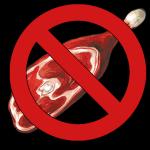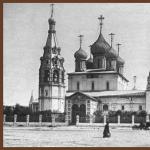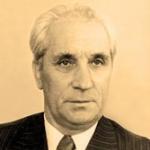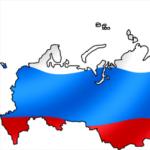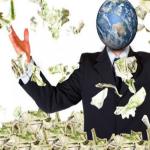Liberals, neoliberals, liberalists: Who are they? What is the difference between them? Liberals. Who is this? Who are liberals in brief?
Thinking out loud
First person
A Brief History of Liberalism. Subtleties of perception. Quite interesting and at the same time clear discussions about Who is Who? I recommend it to improve your educational level.
What is the difference between a liberal and a liberalist?
Andrey (). Co-written with A. Legeyda

Recently, one of my good friends and colleagues, a sensible person, shared such an interesting dialogue. He asked one interlocutor who was extremely aggressive towards liberals: “Can you answer clearly - who is a liberal?” He mumbled something in response and squeezed out: “A liberal is... a liberal.” Let's try to figure out what the difference is, so as not to give such stupid answers in the future.
A liberal is a supporter of liberalism. What is liberalism? The easiest answer is based on the name: it is an ideology that protects freedoms. But the key question is WHOSE freedom and WHICH freedom? There is no freedom at all, just as there is no person at all. Liberalism is an ideology of protecting very specific freedoms and those who crave these freedoms. Let's try to figure out which ones.
TO THE HISTORY OF THE QUESTION
Historically, three stages in the formation of the ideology of liberalism can be distinguished.
First stage takes its origins from the 18th century. Then a party arose for the first time in England, whose adherents somewhat later began to call themselves liberals. These were - attention! - representatives of the big bourgeoisie, who came into conflict with large landowners. The interests of the landlords were expressed by another party - the Conservatives, who, together with the liberals, formed the world's first two-party system: both of these parties, replacing each other, ruled in the British Isles for more than a hundred years - until the beginning of the 20th century.
At that time, Great Britain, ahead of other countries in the industrial revolution, was economically and politically the leading power in the world. Since exploitative societies, as a rule, are dominated by the ideas of the ruling class of the ruling countries, liberalism (like its twin brother, conservatism) spread throughout the capitalist world throughout the 19th century. The bourgeoisie of many countries, and especially the bourgeois and petty-bourgeois intelligentsia, turned to the liberal “faith”, seeing in it an alternative to “violence and tyranny” - both on the right, in the person of monarchical absolutism, and on the left, in the person of Jacobinism, which was then considered the same bogeyman, like “Stalinism” today. Many people mistook any struggle for freedom for liberalism. Our compatriot V.G. Belinsky even wrote: “For me, a liberal and a man are one thing, an absolutist and a whip-breaker are one.” The revolutionaries of France in 1830 considered themselves liberals in a similar sense, and those of Latin America until the beginning of the 20th century.
Second phase in the history of liberalism is associated with the late bourgeois revolutions: from European 1848 to Russian 1905-1917. By that time, the revolutionary democrats, who gravitated towards socialism, albeit utopian for now, had already moved away from the liberals. Liberals of the “second call” are, as a rule, representatives of the bourgeois and petty-bourgeois intelligentsia. Speaking against the “old order”, for reforms or, in extreme cases, “revolution from above”, they most of all feared a revolution of the people, workers and peasants. A classic example of “second wave” liberals are the Russian Cadets (“People’s Freedom Party”). Lenin summed up the ideal of such popular liberalism with the words: “the combination of freedom (not for the people) with bureaucracy (against the people).” In all revolutions, the liberals of that time suffered political collapse, since they were alien to both the working people and the mass of the bourgeoisie, who preferred a “firmer” dictatorial power.
Finally, third stage in the history of the “liberal idea” - neoliberalism (from approximately the 70s of the twentieth century to the present). This is the ideology of transnational corporations that oppose the regulation of their activities by the national state (not only socialist or people's democratic, but also national capitalist). At first glance, they are “anti-state”, which reminds them not even of former liberals, but rather of anarchists. But, taking a closer look, it is not difficult to see that neoliberals are not at all against the punitive and repressive functions of the bourgeois state in relation to the people (which was precisely what caused the greatest protest from anarchists and was often condemned even by former liberals). Neoliberals stand for curtailing the economic and especially social functions of the state, reserving punitive ones. How else can a clearly anti-people, anti-social and anti-national program be imposed on the majority of society?
Thus, there are significant differences between the liberals of the three “calls,” and it is a pity that in today’s Russia it is customary to paint them all with the same brush (for example, in Latin America, the left rightly sees the main enemy not in “liberalism” in general, but in neoliberalism) . But they also have common features.
WHO IS A LIBERAL?
If we try to define liberalism as briefly as possible, it is an ideology that protects the interests of private property. The focus of liberalism is not on the person in general, but on the owner (as if it does not matter who he is - the owner of a shop or a large corporation). The freedom it protects is freedom of property and owners; Political and all other freedoms, strictly speaking, can only be theirs. It is quite logical that the liberals of the first two appeals provided for property qualifications for political rights: for the right to be elected - higher, for the right to vote - lower, but the proletarians and other poor people who did not have any property did not have any rights under this scheme. Let’s say, in the “democratic” republics of Latin America in the 19th century, on average... 1% (one percent!) of the population enjoyed the right to vote. And this right expanded later, under other rulers, with different views.
That is, liberalism is the ideology of private property. Accordingly, a liberal is a supporter of the supremacy of private property. In order to ward off the reproaches of those who do not understand what private property is and may be indignant that I am against personal ownership of toothbrushes and panties, I will only say: private and personal property are fundamentally different things and personal property is not private. But this is a question that requires separate consideration.
Such an ideology has an important consequence - everything that is outside the boundaries of private property, and especially that can violate it, is perceived as hostile. For example, the Argentine liberal president Bartolome Miter, sending punitive forces against the rebellious Indians and semi-proletarian gauchos, called for “not to spare their blood” and “to make of them fertilizer for the fields.” The people of neighboring Paraguay - the then “rogue country” with a state capitalist regime - Miter and his allies exterminated 80 percent. Is this really so different from Hitler’s “Plan Ost” or from what the NATO interventionists are doing with Iraq, Libya, Syria ?
WHO IS A LIBERAST?
And here we come to who the “liberal” is. Liberalism is the most aggressive, chauvinist form of defending and broadcasting liberalism (in our days - neoliberalism). I would say a fascist form of neoliberalism.
For liberals, a friend and brother are another owner; they consider only themselves and other owners to be worthy people. Those people who find themselves outside of property (and in fact the vast majority of them turn out to be) are perceived as working material, as a means for property and the owner. Those liberals who consider non-owners to be second-class citizens, subhumans, turn out to be liberals. Liberalism taken to its logical conclusion, to its apogee, is a form of social “racism”. If in classical fascism the criterion of exclusion is belonging to a particular race, then in liberalism such a criterion turns out to be belonging (ownership or non-ownership) to property (often both criteria coincide in practice - take, for example, “vatniks and Colorados” in the perception of advocates of “European choice of Ukraine"). Those liberals who convey such views in the most aggressive form turn out to be liberals.
There are, of course, liberals and “softer” ones. They focus on criticizing all kinds of repressions (in our case, from Lenin’s to Putin’s), bureaucratic arbitrariness, militarism, clericalism (interference of the church in secular affairs), and, most recently, corruption. They also criticize the anti-social measures of the authorities, sometimes even scolding “their” ultra-liberals for such attempts. With all this they can, as events in a number of countries show, attract part of the working people to their side. Nobody is delighted with repression, bureaucracy, corruption, etc. But for some reason, the people’s support of even such “honest” liberals very soon makes these people not better, but worse.
RHETORIC OF LIBERALS AS A SCREEN
And no wonder. After all, all those manifestations of bureaucracy, militarism, corruption and other evils against which they are trying to rouse the people did not fall from the sky. Can “the state in the proper sense” (F. Engels), while remaining alienated from society, be completely different? Can the people, while they are unable to free themselves from class exploitation, seriously control state power “from below”? And, finally, does this mean that such a “bad” state still does not perform socially necessary functions - first of all, socio-economic ones, which are vitally necessary for the working people and which neoliberals are encroaching on? Thinking wisely, one cannot help but answer all these questions in the negative.
What follows from this? That there is no need to fight arbitrariness, corruption, etc.? It is necessary, of course. But in a smart way, to the best of one’s real ability, soberly realizing that under capitalism all these evils can only be reduced a little, but cannot be eliminated without a revolutionary transition to a qualitatively new society. And even then this matter is long and difficult. And whoever promises to “beat seven in one fell swoop” is simply a demagogue. If he combines this with the exaltation of private property, which is characteristic of even the best of liberals, in modern conditions he will only clear the way for the fascist “liberals.” Whether he wants it or not.
Liberals
Liberals(lat. liberalis- relating to freedom, free), in the original meaning - freethinkers, freethinkers; sometimes - people prone to excessive indulgence. Liberals are also called followers and supporters of liberalism and (in a narrower sense) members of liberal parties.
Wikimedia Foundation. 2010.
See what “Liberals” are in other dictionaries:
Historical Dictionary
- (by this, see liberal). A political party opposed to the absolutists. Dictionary of foreign words included in the Russian language. Chudinov A.N., 1910. LIBERALS etymology see liberal. A political party opposed to the absolutists. Explanation...
liberals- representatives of an ideological and socio-political movement that unites supporters of representative government and individual freedom, and in economics, freedom of entrepreneurship. Liberalism originated in Western Europe during the era of the struggle against... ... Encyclopedic Dictionary of World History
- (from Latin liberalis concerning freedom, free) in the original meaning freethinkers, freethinkers; sometimes people prone to excessive indulgence. L. are also called followers and supporters of Liberalism and (in a narrower... ... Great Soviet Encyclopedia
Liberals and conservatives. Wed. My mother’s brother, Prince Semyon Odolensky, a shameless liberal of the most unliberal time, was a man full of all sorts of contradictions and eccentricities. Leskov. Laughter and grief. 8. Wed. I'm a liberal, but between... ... Michelson's Large Explanatory and Phraseological Dictionary (original spelling)
Wed. My mother’s brother, Prince Semyon Odolensky, a shameless liberal of the most unliberal times, was a man full of all sorts of contradictions and eccentricities. Leskov. Laughter and grief. 8. Wed. I am a liberal, and among my own people I am even considered to be red...... ... Michelson's Large Explanatory and Phraseological Dictionary
I political party in Germany, which separated in 1866 from the Progressive Party (in Prussia). When the successes of the Prussian troops caused an explosion of enthusiasm among the people, many among the Progressive Party could not forget the systematic violations... ...
The commonly used name for a political party in Austria that officially calls itself the United N. Left (Vereinigte Deutsche Linke) club. The founder of the N. liberals was the constitutional Party (Verfassungspartei), which played a prominent role ... Encyclopedic Dictionary F.A. Brockhaus and I.A. Ephron
A political party in the German Reichstag that occupies a neutral position and is inclined to compromise. Dictionary of foreign words included in the Russian language. Chudinov A.N., 1910. NATIONAL LIBERALS political party in Germany, diligently... ... Dictionary of foreign words of the Russian language
Naujoji sąjunga (socialliberalai) Leader: Arturas Paulauskas Date of foundation: 1998 Ideology: social liberalism International ... Wikipedia
Books
- Guardians and liberals. In a protracted search for a compromise. Historical and literary research. In 2 books (set of 2 books), Vyacheslav Ogryzko. For the first time, the idea of the need to create a newspaper for Russian writers was expressed on May 13, 1957 by Nikita Khrushchev at a meeting of the CPSU Central Committee. “And so, maybe,” the Soviet leader suggested then, “...
For many centuries, each layer of society in politics pursued exclusively its own interests, and ultimately, those people who could adapt to certain conditions to the maximum extent became the “helms” of government. Liberals played a huge role in the country. Who are they? First of all, these are people who were ardent supporters of reforms, always advocated for the expansion of rights and
Those who have never heard of who liberals are will be interested to know that they were first talked about in Europe at the turn of the 17th and 18th centuries. It was then that a socio-political movement was born, which was called “liberalism”. Subsequently, it transformed into a powerful ideology. The main value for liberals was the inviolability of economic, political and civil freedoms.
The word “liberalism” entered the Russian language at the end of the 18th century. It was translated as “freethinking.” During this period of time the first Russian liberals appeared.
In English, the translation of this word initially had a negative connotation - “connivance”, “harmful condescension”, but later it was lost.

And yet, who are the liberals, and what kind of liberals did they adhere to? As already emphasized, the highest value for them was human rights and freedoms. In addition, they advocated private property while promoting freedom of enterprise.
The above public political movement was formed as a means of protection against tyranny and excesses on the part of representatives of the Catholic Church and the totalitarianism of monarchs. Who are liberals? These are those who reject the fundamental principles of some theories of state creation, namely the fact that monarchs and kings are “God’s anointed” to reign. They also question the fact that religion is the “ultimate truth”.
Those who have no idea who liberals are will be interested to know that these people defend the principle of equality of all citizens before the law. They are convinced that government officials should regularly report to the people on the work done.
At the same time, representatives of liberalism are confident that officials should in no way limit human rights and freedoms.

English liberals had their own point of view on this matter. Their ideologist Jeremy Bentham argued that human rights and freedoms are nothing more than the embodiment of evil. At the same time, he adhered to those principles that did not allow one person to suppress the will of another.
“To oppress individuals is a real crime. Don’t do this and you will be of great benefit to society,” Bentham emphasized.
It should be noted that liberalism in its modern form also zealously defends the ideas of pluralism and compliance in the management of society. At the same time, the rights and freedoms of minorities and certain segments of the population must be strictly respected. At the same time, liberals believe that the state today should pay more attention to social issues.
" and "liberal" come from the Latin liberalis and literally mean "having to freedom." When we talk about a liberal as a supporter of a socio-political movement, it is assumed that this person stands on a platform that welcomes the deepening and development of political freedoms in the broadest sense of the word. As a rule, liberal ideology unites supporters of democratic parliamentarism, as well as those who stand for freedom of private enterprise.
In everyday life, the label “liberal” is most often given to those who show unnecessary and inappropriate tolerance for other people’s behavior that violates generally accepted norms and rules. It is believed, for example, that excess in the upbringing of the younger generation negatively affects the development of a teenager’s personality. Often the public is asked to put an end to liberalism in relation to criminals and malicious violators of social norms.
in politics
Who can be classified as liberal in the field of activity? We are talking about public figures who support and fully approve of the idea of limiting any interference of government agencies in social relations. The main principles of the liberal value system were formed at a time when bourgeois relations based on free enterprise arose and strengthened in society.
A liberal considers personal, economic and political freedom to be the highest priority in social and political life. For a liberal, the rights of a citizen and his freedoms become a kind of basis and starting point for the formation of a political position. According to liberal politicians, it is the free development of any social relations that makes it possible to build a truly democratic state.
The ideal of many Western politicians is liberal democracy. However, today there is little left in it of the former free-thinking and freethinking. The main emphasis of Western liberal democrats is not so much on expanding the actual freedoms of citizens, but on removing restrictions that hinder the development of private entrepreneurship. Political scientists and sociologists note that the traditions of Western liberalism are penetrating ever deeper into the economy, politics and culture of developing countries.
Political life on our planet is becoming increasingly tense. After the introduction of sanctions, it affects almost every person in the country. Involuntarily, you begin to become interested in what is happening in ruling circles. And you are immediately faced with the question of who liberals are. It arises as soon as you look at a few articles or programs related to Russia’s internal politics. Some liberals are praised in every way, while others criticize them no less loudly. It’s hard to figure out who is right and who is wrong. Surely it is necessary to begin, no matter how unpleasant it may be, with clarification of the essence of philosophy. Namely: what ideas they defend, where they came from, how they see the future, then it will become clear who the liberals are. Let's try to figure it out briefly.
From the history
It is clear that the reader is interested in Russian liberals.
After all, they are the ones who influence his life. However, we will have to rewind time and look at the root of the emergence of this ideology. Otherwise, the essence of what follows will simply be incomprehensible. The fact is that at the moment humanity has given birth to three different ideologies, competing with each other, if not fighting. Their bearers are trying to introduce their own views in various states and build their own system. Let us name the adherents of these three ideas. These are liberals, conservatives and socialists. In a democratic society, parties are created that promote certain ideas. However, each of them adheres to one of the above-mentioned ideologies. Each movement has many subtleties, expressed in the nuances of the proclaimed principles or goals. Some parties are, so to speak, hybrid. That is, they combine the principles of various ideologies in their programs. But this is not particularly important. To understand how Russian liberals influence the situation in the country, the fact that they have ideological opponents is enough. Their confrontation is what shapes internal political life, which certainly affects the well-being of citizens.
Liberal views
We will start with pure theory. That is, let’s consider purely ideology. Then compare it with its competitors to understand more deeply. It must be taken into account that all three ideologies are not just fighting in the minds. The field of their practical implementation is the state structure. That's it, in general. That is, each ideology gives birth to its own social movement. Liberals and conservatives, for example, form political parties that fight desperately for power. Naturally, they need to present their ideas to the electorate in the most advantageous light. What attracts liberals? Their main value is freedom. It extends to all spheres of society. In economics, it is expressed by competition with equal rights. Everyone has heard about this. There is a so-called free market. Liberal citizens are attracted to the rule of law. That is, ideally all people are equal to each other. Everyone has the right to their thoughts and values. In addition, they are offered to be broadcast to the public completely freely. Liberals consider restrictions unacceptable, except in special cases. Namely crimes. Otherwise, a citizen, according to their concepts, has every right to everything he wants. That is, we can answer the question of who liberals are as follows. This is a political movement fighting for full civil liberties. The theory is quite attractive, don’t you think?

Compare with conservatives
The eternal “enemies” of liberals base their ideology on “protection.” Conservatives believe that there should be, even dominate, something unshakable in society. It forms the ideological basis on which everything else develops. For example, today's Russian conservatives talk about family values. This means that this social institution cannot be changed to suit newfangled trends. He is unshakable. To spite them, the LGBT community is being created, a social movement that denies the traditional institution of the family. Liberals and conservatives build their debate around this issue. That is, they try to prove to people the attractiveness of their views, which, we note, in this case are mutually exclusive. The same is observed in the field of organization of the state economy. Liberals stand for complete freedom. Conservatives believe that it is necessary to preserve a certain “established way of life.” For example, neocons talk about the inviolability of private property. By the way, liberals do not contradict them on this. However, they believe that freedom of enterprise cannot be limited by strict rules. That is, any citizen should be able to compete with others on equal terms. It turns out that the liberal movement, in principle, is quite democratic and flexible. In theory, it may well coexist with competitors and find consensus. However, in practice it turns out differently.
Shades of liberalism
Ideology is a rather complex topic. The fact is that the development and embodiment of any thought is impossible instantly. It takes a lot of time to introduce it into society. Fruits, as is commonly believed, appear after years, or even decades. But party supporters are instantly attracted by beautiful slogans or interesting projects. People don't often delve into where a particular idea can lead society. Therefore, it is necessary to understand the shades and nuances of liberal ideology. To do this, let us again turn to history. Thus, in the nineteenth century a special movement arose - the liberal socialists. Its ideology was based on the fact that the working class as a whole became more literate and acquired the right to vote. A typical liberal socialist of that time proposed to fight against child and dangerous labor and for increased earnings. All this was proposed to be enshrined in law. For the nineteenth century, the ideas were quite progressive. Representatives of a different direction, the liberal democrats, believed that the development of civil society could only be hampered by government intervention. He was accused of restricting civil liberties. Both of these liberal movements are in conflict with each other. Socialists believe that democracy cannot coexist with private property. Their opponents talk about the priority of individual freedom, regardless of property status.

Let us specify the differences between liberals and other ideologies
There are several points that will help you understand the essence of the proposed material. Namely, the attitude of representatives of the described ideologies to the fundamental foundations of the state structure. For clarity, socialists, conservatives and liberals are taken. The table contains brief characteristics of their fundamental positions, according to the theory.
From the table above it is clear that liberals defend complete freedom of the individual, even when it is not guaranteed by the state. That is, a person has the right to any self-expression and is burdened with responsibility for its use.
Why and when to study differences in ideologies
In the global world, there are practically no countries where information is censored. It is clear that ideas spread very widely. Any person can choose for himself those that best suit his worldview. In a sense, this state of affairs may pose a threat to statehood. Modern technologies are such that representatives of certain movements try to “recruit” supporters even before they acquire the right to vote. That is, children are already subject to information attacks from adherents of certain movements. This is probably why the school curriculum deals with questions about who liberals and conservatives are (8th grade). The younger generation needs to be prepared to participate in public life. Young citizens must approach it consciously and creatively.

After all, after a while they will have to take over the “reins of government” and begin to make independent decisions. However, the school curriculum does not guarantee that students fully understand who liberals are. The question is very broad and covers a huge period of human history, perhaps the most dynamic. Ideology itself cannot be static. It grows out of the needs of a society that is constantly changing and developing, consistently creating and solving problems. Representatives of one or another ideological direction need to be at the center of these changes, to develop together with countries and peoples.
Liberals of Russia
Only the lazy do not provide a list of people promoting such an ideology in the modern Russian Federation in critical articles. The current confrontation with the West has led to some imbalances in domestic politics. Since it is built on liberal ideas (officially), all shortcomings are usually attributed to them. Here experts lump together economic and social problems, without particularly trying to substantiate their claims with ideological shortcomings. Let's see what the liberals of Russia actually created. The list of their names usually begins with Yegor Gaidar. Is it so? Did this statesman adhere to liberal ideas? This is debatable. Rather, this character, who influenced the formation of modern Russia, professed conservatism. For him, private property was an immutable thing. But the freedom of a citizen is a secondary matter. His phrase about people “who do not fit into the market” is well known. She is cruel in her outright essence, as she treated socially vulnerable citizens. A society for which justice is not an empty phrase, but a real value, could not accept such ideas. The figure of E. Gaidar is recognized by the expert community as the most striking among domestic liberals. This man was not engaged in theory, but in its practical implementation.
Anatoly Chubais, who is well known to everyone, also belongs to the liberals. Naturally, the list of liberals is not limited to two names. One can recall former Russian Finance Minister Boris Fedorov, Russian Prime Minister Mikhail Kasyanov and others. Former Finance Minister Alexei Kudrin is also called a great professional liberal. In general, we can continue to list for a very long time the names of famous people who, unfortunately, often only cause indignation among the population of our country.
Well, nowadays it is customary to include in the social movement “liberals” anyone who criticizes the policies of the President of the Russian Federation. This is not entirely correct, but it is historically justified.

A liberal is one who looks to the West
The point is this. After the destruction of the USSR, society faced a difficult question: “What next?” It just so happened since the century before last that the elite “copied” scenarios from European countries. They believed that the snow was whiter there and the gold glittered brighter. That's what we decided. We will build such a society. During this period, only the communists could give battle to the liberals. There was simply no other force. It should be noted that the communists were one step away from revenge. Zyuganov had excellent chances in the Russian presidential elections. It was not so easy for the people of a huge country, brought up on socialist values, to turn towards perceiving reality in a capitalist worldview. For more than twenty years, they tried to introduce other ideas into society. About equality and freedom of enterprise, about equal opportunities and so on. Only the mouthpieces of this ideology were mostly based on Western examples and principles. In addition, it is known that they did not receive their salaries in the Russian Federation. And for many this looked like a betrayal. And if at the beginning of the construction of the new Russia such facts were perceived as “learning from experience,” then after the Ukrainian crisis the attitude towards dollar salaries changed somewhat. And it's not that the liberal movement did anything bad for people. Rather, historical memory played a role here. The people have not forgotten that Russia had to fight many times. And all the invaders came from exactly the same direction from which they are now trying to teach us.

Economic field of activity
Let's delve a little deeper into the practical side of implementing liberal ideology. Namely, how representatives of the movement represent the country’s economy. It should be noted that they do not detail purely practical issues. Declaratively, liberals proclaim such things as the need for a market economy, with the mandatory removal of the state from its regulation. They strongly oppose any form of administration. That is, the entrepreneur must gain complete freedom in the area of economic activity. Here they are opposed by conservatives who express thoughts about the need, for example, for state intervention in the social sphere. That is, in their opinion, laws are needed to regulate the activities of all enterprises, regardless of their form of ownership. Conservatives and liberals of the Russian Federation have a consensus on only one issue. Namely: they agree that private property should become a paramount value in society. This is an interesting topic. In fact, historically this cannot happen in Russia. That is, private property periodically changed its owner. Even in tsarist times, there were periods when land was owned by those who served the state. With the loss of his place, such a person was deprived of his property. Next everyone remembers the October Revolution and expropriation. That is, for the introduction of the sacredness of the concept of private property into society (as exists in the West), more time must pass than the life of one generation. In addition, a very important point is the practical implementation of freedom of enterprise. Purely, this requires a high educational level of the people. However, liberals in their political struggle focus on opposing government regulation. They give the example of the USA, where a person can open a business in a matter of hours. This is considered a special achievement of liberal democracy. Only they lose sight of the fact that after a year, 95% of new entrepreneurs go bankrupt. And of those who survived, half leave the arena within a few years. Liberals call it competition. But in fact, this phenomenon looks like a way to enrich the banks that issue loans to these hapless entrepreneurs.

Why people in Russia “don’t like” liberals
We have not touched upon another important topic. Namely, the attitude of representatives of liberal ideology to issues of social protection and cultural development of the population. And this is the reason for the people’s antagonistic attitude towards them. The fact is that liberals, calling for complete freedom, allow serious distortions in the social manifestations of their policies. Take the LGBT community for example. There is nothing wrong with the fact that any person has every right to live the way he wants. This is a personal matter! However, why highlight non-existent problems of minorities? Do they concern the entire society that professes traditional values? It just so happens that patient and kind people live in Russia. By the way, liberals call this quality tolerance. The point is not in the term. It’s just common among people to feel sorry for outcasts and apostates (not traitors). You have your own vision of how to love - no one will throw stones for it. It's a different matter if you shout to the whole country about your preferences. Until it affects the majority of the population, no one will say a word. As soon as society begins to feel threatened, things take a different turn. For example, today many people ask the question: “If liberals defend the minority so loudly, then who will stand up for the majority?” There is a clear imbalance in political pressure on the people. The latter begins to resist. Well, values don’t take root in it, just like any values in the West. The statements of liberals, especially recently, only aggravate the situation, which is unfavorable for them. For example, Khodorkovsky’s phrase “it’s a shame not to steal from such a state” cannot be perceived as the slogan of a person worthy of trust. Or K. Sobchak’s statement that Russia is “a country of genetic scum.” This is humiliating both for the people and for this representative of the “elites”. Therefore, it is so natural to treat liberals as traitors. Carried away by Western values, these people have completely lost touch with the people for whom they should live, think and work. After all, this is precisely the purpose of the elites.
conclusions
We will not argue that liberal ideas are as bad as they seem today. Not everything in this ideology is aimed at destroying society. Quite the opposite. Many of the ideas that have already been implemented were promising and humane. For example, the fight to ban child labor. However, ideas have their own “lifespan”. They must either transform to meet the needs of society or fade into oblivion. And the first sign of the need for such changes is their hypertrophied, even grotesque, manifestation. This is exactly what we are seeing today. What happens next? Can liberalism survive and change? Time will tell.
